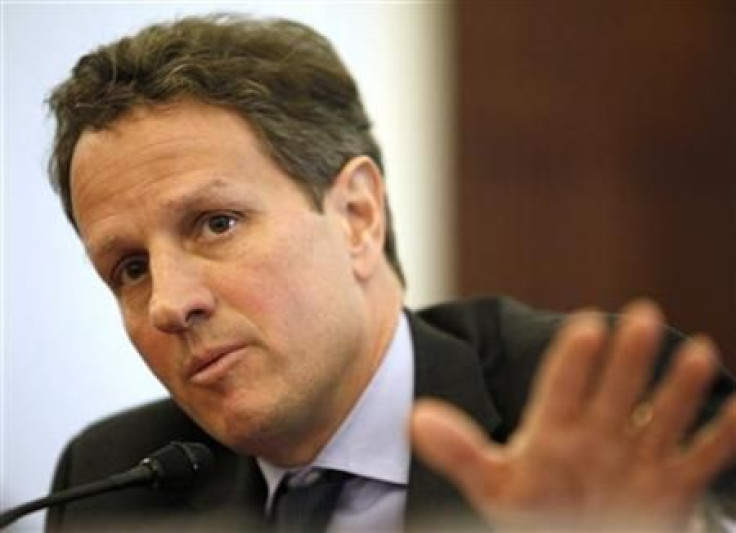In 'Stress Test,' Tim Geithner Fires Back At His Many, Many Critics

In his new memoir, mild-mannered former Treasury Secretary Tim Geithner unleashes his inner avenger, ripping many of the politicians, executives and government officials who crossed him over the last two decades, from JPMorgan & Co. (NYSE:JPM) CEO Jamie Dimon to liberal Sen. Elizabeth Warren, D-Mass. In "Stress Test," Geithner defends the decisions he made during the financial crisis, takes on accusations that he was too close to Wall Street, and even admits that he sounded like a bank lobbyist while opposing derivatives reform proposals in the late '90s.
Here are some of the personalities he skewers:
Wall Street
Though generally praiseworthy of JPMorgan Chase & Co. (NYSE:JPM) CEO Jamie Dimon, Geithner does make fun of him for once offering President Obama some of his executives to help draft upcoming financial reforms. Dimon was irritated that Obama turned him down, “as if it would have been a feather in our caps to let Wall Street’s most powerful firm help write our new Wall Street regulations.”
He also lashes out at former Merrill Lynch Chairman John Thain for seeking assurances on executive compensation amid the heated discussions over the bank bailouts at the height of the financial crisis.
Government
During his tenure, Geithner was often criticized by former TARP Inspector General Neil Barofsky over the terms of the bailout of the banks. In his book, Geithner gets his revenge, snapping that “Barofsky’s desire to prevent perfidy was untainted by financial knowledge or experience.” Barofsky was “outraged by every program, uninterested in context, unmoved by evidence of success,” writes Geithner, who also mocked the former prosecutor for arming his anti-fraud team with weapons and bulletproof vests. He also says that his predecessor, Hank Paulson, once apologized to Geithner for leaving him with Barofsky.
Out of annoyance with then-Federal Deposit Insurance Corporation Chief Sheila Bair's "flawed" proposals to reform the financial system and suspicious that she was leaking stories to the press, Geithner’s staff set up a sting operation: “My staff got so annoyed by the drumbeat of FDIC-planted stories that at one point they gave Sheila’s aides a harmless snippet of wrong information, just to see if it would end up in the media. It quickly did.”
Geithner also mocks Brooksley Born, the former chairwoman of the Commodity Futures Trading Commission, who was the main proponent of derivatives reform during the late-'90s in the Clinton administration. He writes that the popular narrative of Born's crusade "has been boiled down to a morality play, pitting a heroic Born against nefarious financial Goliaths," but that the truth was much more nuanced. Dismissing the substance of her argument that such complex financial instruments posed a threat to the stability of the financial system, Geithner boils it down to a turf war between the Federal Reserve, banks and exchanges. Geithner makes fun of Born's note-taking style by recalling one meeting at CFTC when she pulled out a yellow pad and started "reading from dozens of handwritten notes about our messy securities laws. She clearly felt strongly about the cause of reform, but her proposals for reform were mostly impenetrable."
Congress
After years of silently suffering slings and arrows shot by now-Sen. Elizabeth Warren, D-Mass., Geithner finally gets his chance to get back at her. Her criticisms were “mostly unjustified,” and her oversight hearings were “more like made-for-YouTube inquisitions than serious inquiries.” She “was better at impugning our choices … than identifying any feasible alternatives.”
Other members of Congress weren’t much better – either baldly demanding favors for favored constituents or reveling in the sound of their own jeremiads. While fighting for the Volcker Rule, which would have banned banks and financial firms from using their own capital to trade for speculative purposes, then-Sen. Chris Dodd, D-Conn., asked for incentives for fellow Sens. Scott Brown, D-Mass., Judd Gregg, R-N.H., Mark Warner, D-Va., Evan Bayh, D-Ind., and John Kerry, D-Mass., by creating loopholes for trusts, sweep accounts, insurance companies and affiliates, feeder funds, hedge funds with seed capital, “and most firms in Massachusetts” (both Brown and Kerry represented the state). Brown barenly told Geithner that two companies in Massachusetts, Fidelity and State Street, needed to be protected from the Volcker rule.
In addition, he describes Sen. Richard Shelby, R-Ala., as so easily intimidated by his staff, who wanted the congressman to toe the line on conservative policy, that a single glance from one of them could get him to change his rhetoric. As for Senate Minority Leader Mitch McConnell, R-Ky., Geithner writes that he considered his “beliefs and methods offensive.”
And he accuses Sen. Mark Kirk, R-Ill., of undermining American policy in China, writing that the senator “advised [the Chinese] not to buy Treasuries or other U.S. government debt, warning them that our spending was driving us toward default, and that the Fed was creating hyperinflation.” Geithner was shocked at Kirk’s comments: "I couldn't believe it. Not only were those fears delusional, but he was undermining American interests on foreign soil.”
Others
More than three decades after graduating from Dartmouth, Geithner also gets his chance to recount his diss of a fellow classmate. When Dinesh D’Souza, a conservative commentator, published a list of gay students on campus, Geithner confronted him at a coffee shop “and asked him how it felt to be such a dick.”
© Copyright IBTimes 2024. All rights reserved.











